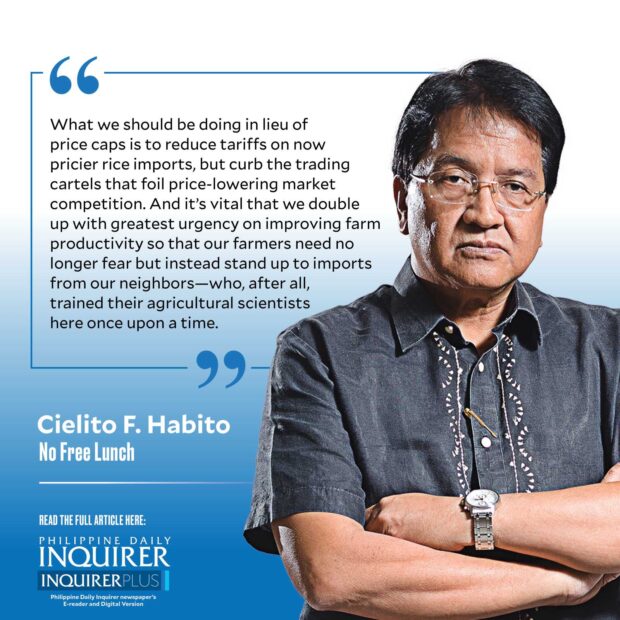Price caps make things worse
 We’ve probably all heard the story of a past president who wanted the law of supply and demand repealed. The problem is that it’s not a law that is legislated, but a universal principle that holds true under any market system. The P41 and P45 per kilo price caps on regular-milled and well-milled rice, respectively, ordered by the President effective today represent yet another effort to defy that law. Forcing price caps in a largely competitive market where prevailing prices are much higher is, in effect, an attempt to “repeal” the law of supply and demand, the consequences of which could be more disastrous than the problem it hopes to solve.
We’ve probably all heard the story of a past president who wanted the law of supply and demand repealed. The problem is that it’s not a law that is legislated, but a universal principle that holds true under any market system. The P41 and P45 per kilo price caps on regular-milled and well-milled rice, respectively, ordered by the President effective today represent yet another effort to defy that law. Forcing price caps in a largely competitive market where prevailing prices are much higher is, in effect, an attempt to “repeal” the law of supply and demand, the consequences of which could be more disastrous than the problem it hopes to solve.
Rice retailers and rice farmers have been quick to raise a howl over the measure, and even threaten to openly defy it. The president of the 300-strong Grains Retailers’ Confederation of the Philippines in Eastern Visayas was quoted as saying: “As far as we are concerned, no, we will not comply … How can we recover our losses? They should give us a leeway and not give us a deadline. Most of us bought our supplies before the issuance of the rice cap order and doing so would lead to losses.” At least two farmers’ groups have also aired alarm over the expected result of depressed farm gate prices.
On the other hand, consumer groups have not been jumping with joy, some because they don’t think the caps are low enough, but the better-informed and more perceptive among them understand the wider harm that could result. Leading agricultural economist Dr. Roehlano Briones points out that it would hurt consumers because it will lead to shortage, rampant adulteration (where cheap, possibly even stale rice is mixed with and passed off as good rice), deceptive reclassification of rice grades (passing off lower for higher grades), and other tricks in the book that have uniquely come about in our rice industry over decades of excessive regulation—all detrimental to consumers.
What consequences could we expect from the caps? A former Department of Agriculture (DA) undersecretary predicts that we will soon see rice shortage, black markets, and rice queues. This is because rice traders who had bought supplies at a higher price would have the natural impulse to sell only in the black market to recover costs—and stop buying any further because it could only mean losses. The result would be reduced market supplies and upward price pressure, cap or no cap. When price is forced lower than the market equilibrium price—that is, the price at which quantities sold would match quantities demanded—more will be demanded than what suppliers would like to sell, leading to a shortage. The only way the price cap could be made to hold would be to ration the available rice and force households to limit purchases to less than what they would wish to buy. Think of what it would cost government to enforce such rationing (would they police every retail outlet?), and the lines that would form in stores as people would know there just aren’t enough stocks to meet everyone’s desired purchases.
The other recourse is for government to fill the supply gap, and that would mean direct purchase of rice with taxpayer money, at prices unlikely to be any lower (in fact, likely to be higher) than the price cap, especially with currently elevated world prices. Add to that the huge administrative costs involved, and it all adds up to a futile effort of taking money from our left pocket in order to put it in our right pocket—with leakages along the way. It only makes sense for those who would benefit from the leakage, and in the sad story of our country, that is precisely the reason why we keep seeing government do all the wrong things, especially in our badly battered agriculture sector. Don’t be surprised, then, if government decides to overturn the game-changing rice tariffication law and engages in direct importation all over again. I could only weep for our country, as you should, too.
What we should be doing in lieu of price caps is to reduce tariffs on now pricier rice imports, but curb the trading cartels that foil price-lowering market competition. And it’s vital that we double up with greatest urgency on improving farm productivity so that our farmers need no longer fear but instead stand up to imports from our neighbors—who, after all, trained their agricultural scientists here once upon a time. It’s not as if we can’t do it. Experts I constantly talk to know exactly what must be done. But as long as our DA and local governments don’t shape up for the task, all that knowledge will not help us.
Meanwhile, price caps could be a cure worse than the disease itself. I’m hoping they’re stopped before they can do further damage.
cielito.habito@gmail.com




















